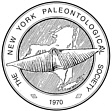
|
NEW YORK
|
|
PALEONTOLOGICAL SOCIETY
|
|
MEETING ANNOUNCEMENT
|
|
MISSISSIPPI FOSSILS: A JOURNEY THROUGH MISSISSIPPI’S GEOLOGIC PAST as told through our State’s Rich Paleontological Record James E. Starnes Research Director for the Surface Geology and Surface Mapping Division, Mississippi Department of Environmental Quality’s Office of Geology, Mississippi State Geological Survey
Sunday, May 18, 2025 2:00 P.M.
THIS MEETING WILL BE HELD ONLINE The state of Mississippi’s lies on the eastern flank of the Mississippi Embayment; a southward plunging structural syncline along the northern Gulf of Mexico, shallowing northward. A thick wedge of sediment dating back to the Mesozoic records the development of our part of the Gulf Coastal Plain. Expressed at the surface are a series of broad, arcuate, off-lapping outcrop belts that representing cycles of oceanic transgressions and fluvial/deltaic dominated regressions. These deposits descend in age to the south and west from Late Cretaceous (in the northeastern part of the state) to Pleistocene (along our Gulf Coast and the Mississippi River Alluvial Plain). There is little interruption within this part our geologic record with most depositional environments conducive for excellent fossil preservation. This positions Mississippi’s geology as an important region for paleontological research and reference section for biostratigraphical study. Join me as we take a trip back through geologic time using Mississippi’s fascinating fossils discoveries as our guide.
N.Y.P.S. MEETING DATES FOR THE YEAR These are the meeting dates of the New York Paleontological Society for the 2024-2025 season. We normally meet at 2:00 P.M. in a room at the American Museum of Natural History in New York City (79th Street and Central Park West). However, due to policy changes and new construction, the Museum is unable to assign any rooms for meetings for any groups at this time. Exactly when the Museum will allow groups like our Society to reserve rooms is uncertain. But, since room availability may change, it has been decided to hold online meetings on the regular dates and times so that the schedule remains the same whether the meeting is in a room or online. One advantage of online meetings is that they will be recorded so members who can’t attend at the meeting time can view the whole meeting afterwards at their convenience.
Our Annual Party would normally be held at the NYU Tandon School of Engineering in Brooklyn, but new construction may effect the availability of a large enough venue space. Note, due to the nature of the party (many tables, events, talks and wonderful food), this event cannot be held online.
As of this writing, all of the dates this year are on the third Sunday of the month, except April’s. Also, our Annual Holidays Party would be held if possible on a Saturday (the date to be determined), but, again, the available venue space and rules may effect this event. The dates are as follows:
|
|||||||||||||||
About Join Meetings Field Trips
Publications Education Links News Links Home